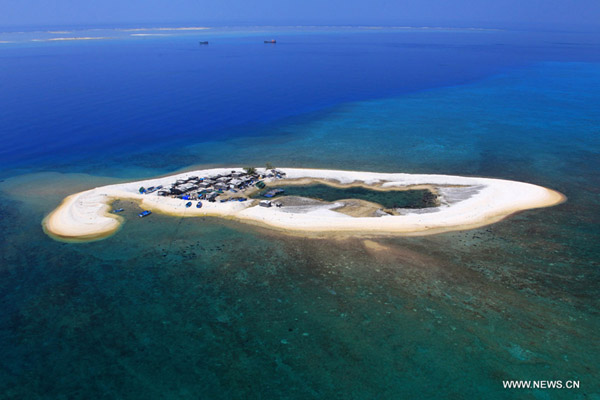Regional countries need dialogue to safeguard peace


Regional countries should promote dialogue and cooperation to safeguard peace in the South China Sea and firmly oppose external interference, according to attendees at the Boao Forum for Asia.
"Dialogue and consultation provide the fundamental pathway to resolving differences," said Nong Rong, assistant minister of China's Foreign Ministry, during a panel discussion on Building an Order of Cooperation and Security in the South China Sea at the Boao Forum for Asia Annual Conference 2023 in Hainan province on Thursday.
Nong's remarks were delivered by Tan Qingsheng from the ministry's Boundary and Ocean Affairs Department.
Countries involved should turn the South China Sea into an area of cooperation instead of conflict, said Gloria Macapagal Arroyo, former Philippine president, recalling the statement she made in 2005.
"Our region's hard-earned achievements took decades to build and we can only continue to enjoy them by maintaining trust, peace and stability in our part of the world," said Arroyo.
Noting there is a need to deepen mutual trust in promoting maritime cooperation, Nong said a certain major country outside the region has been expanding military deployment in the region, deliberately stirring up conflict and has thus created threats to regional peace and stability.
The United States has maintained intensive military operations in the South China Sea, with about 1,000 large reconnaissance aircraft sorties conducted last year, according to Beijing-based think tank South China Sea Strategic Situation Probing Initiative.
Liu Zhenmin, former under-secretary-general for economic and social affairs at the United Nations, said the member states of the Association of Southeast Asian Nations, or ASEAN, and China should understand that the goal of the code of conduct is not to eliminate existing disputes but to create a cooperative framework for the joint management of the South China Sea by putting aside differences.
The year 2022 marked the 20th anniversary of the signing of the Declaration on the Conduct of Parties in the South China Sea, or DOC. In a meeting with ASEAN Secretary-General Kao Kim Hourn on Monday, Chinese State Councilor and Foreign Minister Qin Gang said China is ready to work with ASEAN countries to adopt the Code of Conduct in the South China Sea as soon as possible.
"The ecosystem of the South China Sea is fragile so we should actively work for the sustainable use of the South China Sea," said Liu Zhenmin, noting both regional countries and non-regional countries should take the issue seriously and reduce pollution such as oil and plastics.
Since the signing of the DOC, China and relevant countries have carried out a wide range of cooperation in maritime transport security, including providing necessary financial support, ensuring navigation safety and tackling transnational crimes, said Li Guoping, chief safety supervisor of China's Ministry of Transport.
Having tracked the code of conduct negotiation for decades, Michael Vatikiotis, a senior adviser at the Centre for Humanitarian Dialogue, said such discussions serve in themselves as a confidence building mechanism that keeps the littoral states engaged and in dialogue on potentially divisive issues.
"The US should deal with the South China Sea disputes through a diplomatic manner," said Wu Shicun, chairman of the China-Southeast Asia Research Center on the South China Sea.
The move by the US to expand its military deployments in the region not only harms regional peace but also puts regional countries in a dilemma where they have to choose sides, said Wu.
Both the US and China need to emphasize the concept of cooperative security, which means neither society can achieve security for itself without addressing the security concerns of the others, said David M Lampton, professor emeritus of China studies at the Johns Hopkins School of Advanced International Studies in the US.
"There is no such thing as unilateral security," he said.
- Legal tools essential for AI regulation
- China launches remote-sensing satellite for Algeria
- China reports drop in workplace accidents, fatalities in 2025
- From Kansas to karst: Unpacking Guangxi's charms
- China carries out nearly 8.5m hectares of land greening in 2025
- Chongqing red leaf festival draws record 4.7 million visitors




































